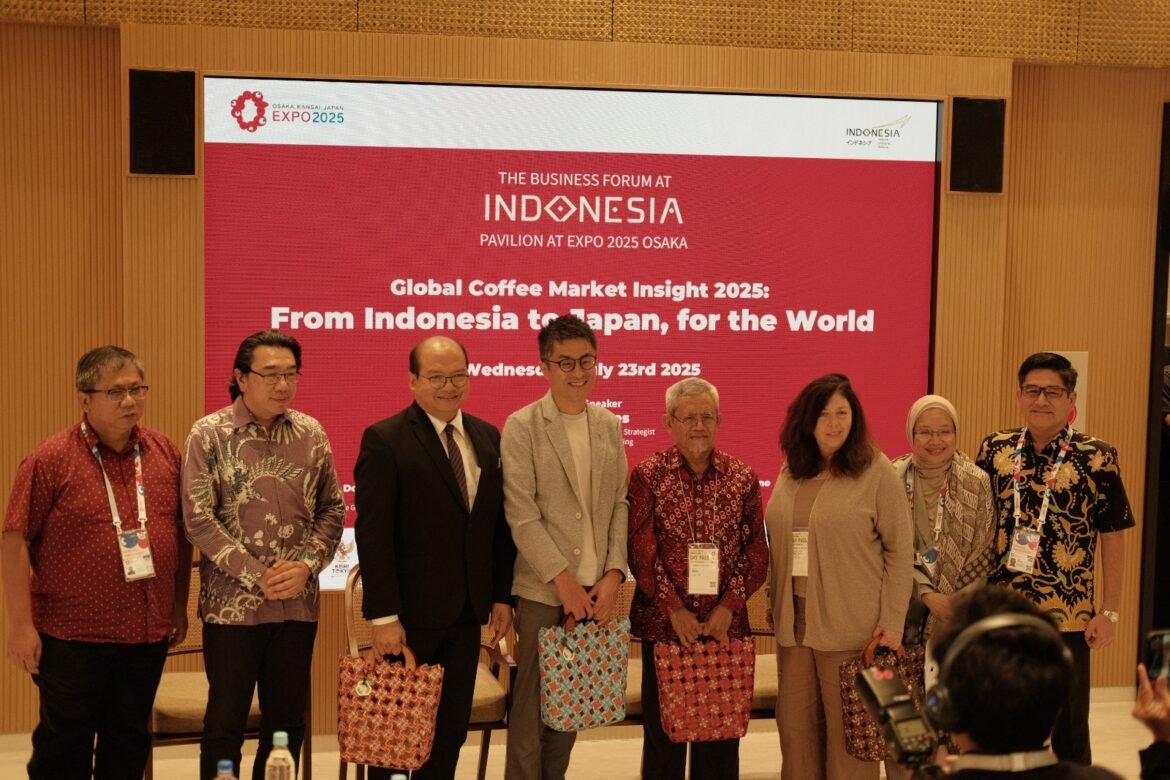Rebuilding Indonesia’s Coffee Legacy Through Innovation, Collaboration, and Sustainable Excellence
The Japanese coffee market is entering a new phase—one that prioritizes high-value, consistent, and sustainable products. As one of the world’s largest coffee producers, Indonesia is strategically positioned to reclaim its role as a key player in the global supply chain, particularly in Japan, a country with deep historical ties to Indonesian coffee.
In response to this opportunity, the Indonesian Coffee Advancement and Education Foundation (KAPPI) hosted an international forum titled “Global Coffee Market Insight 2025: From Indonesia to Japan, for the World” at the Indonesia Pavilion, World Expo Osaka. The event brought together global experts, industry leaders, and policymakers to reassess Indonesia’s position in an increasingly competitive and disrupted coffee market.
Judith Ganes, a leading coffee consultant from J. Ganes Consulting, delivered a comprehensive analysis of current market dynamics, highlighting fluctuations in global pricing trends and supply prospects. “Our visits to coffee plantations in Sekincau, Lampung, and Warnasari, West Java revealed the extraordinary potential of highland coffee with unique characteristics, promising varietal experiments in Robusta and Arabica, and strong community involvement in processing,” said Ganes. “Most encouraging is the emergence of a highly promising new generation of coffee farmers.”
Ganes’ insights reflect Indonesia’s strategic response to global challenges—through quality enhancement, varietal diversification, community-based sustainable farming, and farmer regeneration. These efforts are laying the foundation for Indonesia to thrive in high-value export segments.
The forum builds on the success of KAPPI’s previous event, “Comeback with Confidence – Reviving the Glory of Indonesian Coffee in Japan,” which addressed trade disruptions caused by Japan’s stricter Maximum Residue Limit (MRL) regulations. The dialogue led to actionable solutions, including farmer education, improved laboratory testing, and transparent traceability systems.
Masataka Nakano of Key Coffee Inc. emphasized the importance of flavor consistency and quality to Japanese consumers. He noted that Indonesian coffee, when able to maintain these standards, holds a special place in Japan’s market. Key Coffee’s long-standing partnership with Indonesia through PT. Toarco Jaya in Toraja, established in 1976, exemplifies this enduring relationship.
From a diplomatic perspective, Dody S. Sembodo Kusumonegoro, Minister Counsellor at the Consulate General of Indonesia in Osaka, highlighted coffee’s role in cultural diplomacy. “The Indonesia-Japan coffee relationship is a long-standing story that unites culture, taste, and values. Through this forum, we are reopening strategic dialogue to strengthen Indonesian coffee’s place in the hearts of Japanese consumers,” he stated.
Moelyono Soesilo, Head of the Specialty Coffee Division at AEKI, noted that regulatory challenges such as MRL have catalyzed systemic improvements. These include safe pesticide training, enhanced laboratory testing, and the implementation of intercropping systems—all aimed at ensuring compliance with international standards.
Roby Wibisono, official representative of KAPPI, reinforced the foundation’s long-term vision: “We believe the future of Indonesian coffee lies in the new generation of farmers and coffee professionals growing together—from farm to café, from producer to consumer. Through research, training, and quality standard enhancement, we are not just shaping the future of Indonesian coffee—we are defining it for the world.”
With support from Japanese industry leaders such as UCC Japan and Key Coffee, and collaboration among government bodies, associations, and local coffee communities, Indonesia is rebuilding a resilient and sustainable export pathway—ensuring its coffee remains a preferred choice for years to come.
About KAPPI The Indonesian Coffee Advancement and Education Foundation (KAPPI) is a non-profit organization committed to enhancing the competitiveness of Indonesian coffee through education, training, and advocacy for global standards. Its mission is to cultivate a new generation of coffee farmers and professionals equipped to meet the challenges of the future coffee industry—from upstream to downstream.
Media Contact
Pangesti Boedhiman (Communications Coordinator)
+62 813 9926 9922



